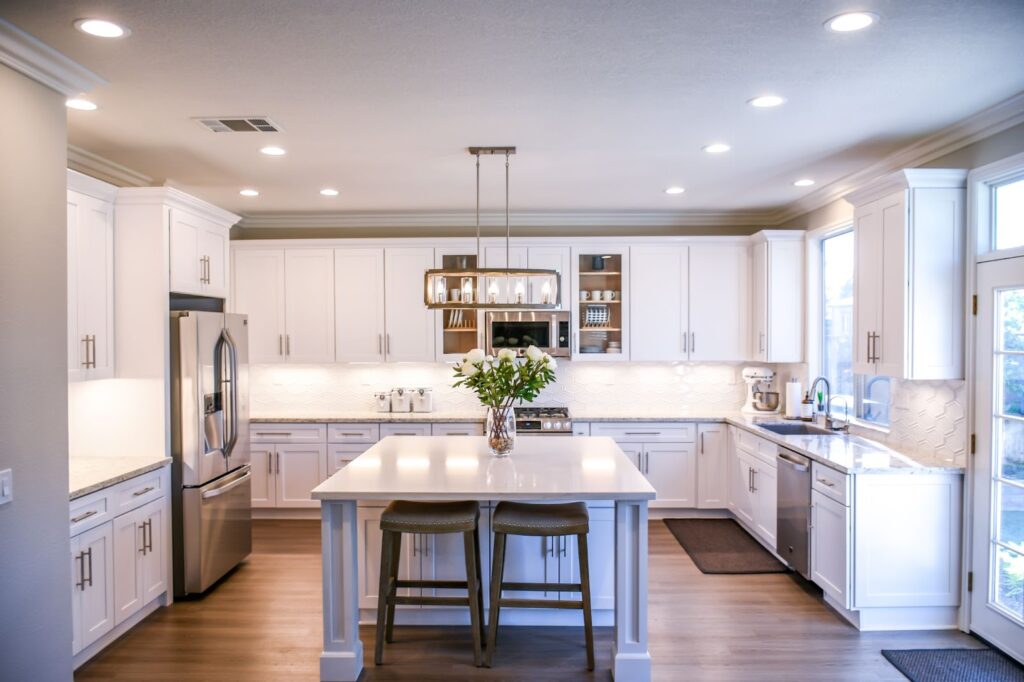Thinking about buying a home can be both exciting and overwhelming. It’s a significant milestone that requires careful planning and consideration. If you’re ready to take the first step towards homeownership, it’s important to understand what that entails.
The first step in buying a home is assessing your financial situation. Before you start browsing listings or attending open houses, take the time to evaluate your budget and determine how much you can afford to spend on a house. This includes considering factors such as your income, savings, credit score, and any outstanding debts.
Once you have a clear understanding of your financial standing, the next step is getting pre-approved for a mortgage. This involves working with a lender who will assess your financial information and provide you with an estimate of how much they are willing to lend you for a home purchase. This pre-approval letter not only gives you an idea of your budget but also shows sellers that you are serious about buying.
By taking these initial steps, assessing your finances and getting pre-approved for a mortgage, you’ll be well-equipped to begin the journey of buying your dream home. Remember that this process takes time and patience, so don’t rush into making decisions. Stay informed, seek advice when needed, and enjoy the excitement of finding your perfect place to call home.
Understanding the Home Buying Process
When it comes to buying a home, understanding the process is crucial. It can feel overwhelming at first, but with a little knowledge and preparation, you’ll be well-equipped to navigate through each step. Let’s break it down:
- Setting your budget: Start by determining how much you can afford to spend on a home. Consider factors such as your income, expenses, and any existing debts. This will give you an idea of what price range to focus on.
- Getting pre-approved for a mortgage: Before you begin house hunting, it’s wise to get pre-approved for a mortgage. This involves providing necessary financial information to a lender who will evaluate your creditworthiness and determine how much they are willing to lend you.
- Engaging with real estate agents: Work with experienced real estate agents who have expertise in the local market. They can help guide you through the process, find suitable properties that meet your criteria, negotiate offers on your behalf, and handle paperwork.
- Finding the right property: Begin searching for homes that meet your needs and preferences. Consider factors like location, size, layout, amenities, and proximity to schools or workplaces.
- Making an offer: Once you’ve found the perfect home, make an offer based on market conditions and comparable sales in the area. Your agent will assist in negotiating terms with the seller.
- Conducting inspections: After reaching an agreement with the seller, arrange for professional inspections of the property to identify any potential issues or repairs needed before finalizing the purchase.
- Securing financing: Finalize your mortgage loan by providing all required documentation and working closely with your lender throughout this stage.
- Completing legal processes: Hire a qualified attorney or title company to conduct title searches and ensure there are no issues or liens on the property that may affect ownership rights.
- Closing the deal: Attend the closing meeting, where you will sign all necessary paperwork, pay any remaining fees or costs, and officially take ownership of the property.
- Moving in: Once everything is finalized, it’s time to move into your new home! Coordinate with movers, transfer utilities, and enjoy making your new space your own.
Remember, each home buying journey is unique, and timelines may vary. Stay organized, ask questions along the way, and rely on professionals for guidance. Happy house hunting!
| Important Tips |
| – Determine your budget before starting the search |
| – Get pre-approved for a mortgage to strengthen your offer |
| – Work with experienced real estate agents |
| – Conduct thorough inspections before finalizing the purchase |
| – Hire an attorney or title company to ensure legal compliance |
Determining Your Budget and Financial Readiness
Introduction
When it comes to buying a home, one of the first steps you should take is determining your budget and financial readiness. This crucial step will help you understand how much you can afford to spend on a house and whether you are financially prepared for homeownership. In this section, I’ll provide some valuable tips and insights to guide you through this process.
Assessing Your Finances
Before diving into the housing market, it’s essential to assess your current financial situation. Here are some key aspects to consider:
- Calculate your income: Determine your monthly income after taxes and deductions. This will give you an idea of how much money is available for mortgage payments.
- Evaluate your expenses: Take stock of your monthly expenses, including bills, debts, groceries, transportation costs, and any other significant financial obligations.
- Analyze your savings: Review your savings accounts and investments to see if you have enough funds for a down payment or closing costs.
- Check your credit score: A good credit score is vital when applying for a mortgage loan. Obtain a copy of your credit report from one of the major credit bureaus (Equifax, Experian, or TransUnion) and review it carefully for any errors or discrepancies.
Setting Your Budget
Once you have a clear understanding of your finances, it’s time to set a realistic budget for purchasing a home:

- Determine affordability: Use online calculators or consult with a mortgage professional to estimate how much house you can afford based on factors like income, debt-to-income ratio, down payment amount, interest rates, and loan term.
- Consider additional costs: Remember that owning a home entails more than just the purchase price – there are also property taxes, insurance premiums, maintenance expenses, and possibly homeowner association fees.
- Have an emergency fund: It’s wise to maintain an emergency fund to cover unexpected costs or financial setbacks. Aim for three to six months’ worth of living expenses saved up.
Seeking Professional Guidance
Navigating the world of real estate and mortgages can be overwhelming, so don’t hesitate to seek professional guidance:
- Consult with a mortgage lender: A reputable mortgage lender can help you understand your loan options and pre-approve you for a specific loan amount.
- Hire a financial advisor: If you’re unsure about your overall financial readiness, consider consulting with a financial advisor who specializes in homeownership.
Remember, determining your budget and financial readiness is an essential step that shouldn’t be rushed. Taking the time to assess your finances carefully will ensure that you make informed decisions as you embark on the exciting journey of buying a home.
Researching and Selecting a Real Estate Agent
When it comes to buying a home, one of the crucial steps is finding the right real estate agent to guide you through the process. Here are some key factors to consider when researching and selecting a real estate agent:
- Ask for Recommendations: Start by reaching out to friends, family, or colleagues who have recently purchased a home. They can provide valuable insights and recommendations based on their own experiences.
- Do Your Homework: Take advantage of online resources such as real estate websites and social media platforms to research agents in your area. Pay attention to their credentials, experience, and client reviews.
- Interview Multiple Agents: Don’t settle for the first agent you come across. Take the time to interview multiple agents to ensure they align with your needs and objectives. Ask about their expertise in your desired neighborhood, their availability, and how they plan to assist you throughout the home-buying process.
- Check Their Credentials: Look for agents who are licensed professionals with relevant certifications or designations in real estate specialties such as buyer representation or relocation services. This demonstrates their commitment to ongoing education and professionalism.
- Evaluate Communication Skills: Effective communication is vital when working with a real estate agent. During your initial interactions, assess how well they listen to your needs, provide clear explanations, and respond promptly to your inquiries.
- Consider Local Market Knowledge: A knowledgeable agent will have a deep understanding of local market trends, pricing strategies, and inventory availability. They can help you make informed decisions based on current market conditions.
- Review Their Track Record: Take note of an agent’s track record in terms of successfully closing deals for buyers like yourself. Look for evidence of strong negotiation skills and an ability to navigate challenging situations.
Remember that finding the right real estate agent is a personal decision that depends on your individual preferences and goals as a homebuyer. By conducting thorough research and interviews, you’ll increase your chances of finding a trusted professional who can guide you through the exciting journey of purchasing your dream home.
Exploring Different Neighborhoods and Areas
When it comes to buying a home, one of the most crucial steps is exploring different neighborhoods and areas. This is where you’ll lay the foundation for your future lifestyle, so it’s important to approach this process with curiosity and thoroughness. Here are some key points to consider as you embark on your neighborhood exploration journey:

- Location, location, location: The phrase may be cliché, but its importance cannot be overstated. Start by identifying your priorities – proximity to work, schools, amenities, or natural surroundings – so that you can narrow down your search based on those criteria.
- Research is key: Before physically visiting neighborhoods, take advantage of online resources to gather information about crime rates, school districts, transportation options, and local attractions. Websites like Niche or GreatSchools can provide valuable insights into community statistics and rankings.
- Get out there: Once armed with knowledge from online research, it’s time to hit the streets! Visit different neighborhoods at various times of the day to get a feel for their energy and ambiance. Take note of factors like noise levels, traffic patterns, and general upkeep.
- Talk to locals: Engaging with current residents is an excellent way to gain firsthand perspectives on a neighborhood’s strengths and weaknesses. Strike up conversations with shop owners or people walking their dogs in the area – they often have invaluable insights about what makes their neighborhood special.
- Consider long-term growth: Look beyond just the present state of a neighborhood; think about its potential for growth and development in the future. Is there ongoing investment in infrastructure? Are new businesses moving in? These indicators can point towards an area that has good prospects for appreciation over time.
- Explore amenities: Evaluate nearby amenities such as parks, restaurants, shopping centers, or recreational facilities that align with your interests and lifestyle choices.
- Trust your instinct: Ultimately, trust your gut feeling. Buying a home is a significant decision, and finding the right neighborhood is crucial for long-term satisfaction. If something doesn’t feel right or align with your vision, it may be best to keep searching.
Remember, exploring different neighborhoods is an exciting part of the home-buying process. Take your time, gather as much information as possible, and trust yourself to make the right choice for you and your future. Happy house hunting!
Identifying Your Must-Have Features in a Home
When it comes to buying a home, one of the first steps is determining your must-have features. These are the non-negotiable aspects of a home that you simply cannot live without. It’s important to identify these features early on in the process, as they will guide your search and help you find a home that meets your needs and preferences.
Here are some key points to consider when identifying your must-have features:
- Prioritize: Start by making a list of all the features you desire in a home. This could include anything from the number of bedrooms and bathrooms to specific architectural styles or proximity to schools and amenities. Once you have your list, prioritize each item based on its importance to you.
- Non-negotiables: Identify the features that are absolute deal-breakers for you. These could be things like a backyard for your pets, an open-concept layout, or a certain location within your desired neighborhood. Knowing what you absolutely need will help narrow down your options.
- Budget considerations: Keep in mind that some must-have features may come at an additional cost. Be realistic about what fits within your budget and what compromises can be made if necessary.
- Future needs: Consider not only what you need now but also what you may need in the future. Are you planning to expand your family? Will aging parents be moving in? Anticipating future needs can help ensure that the home you choose will continue to meet your requirements for years to come.
- Flexibility: While it’s important to know what is non-negotiable for you, it’s also essential to remain flexible throughout the process. Sometimes, unexpected opportunities arise that might exceed our initial expectations or present new possibilities we hadn’t considered before.
By taking the time to identify your must-have features, you’ll have a clearer vision of what kind of home best suits your lifestyle and preferences. This will not only streamline your search but also increase the likelihood of finding a home that you can truly call your own.
Remember, buying a home is a significant investment, so taking the time to identify your must-haves ensures that you make an informed decision that aligns with your needs and desires. Happy house hunting!
Getting Pre-Approved for a Mortgage Loan
Introduction
One of the crucial steps in buying a home is getting pre-approved for a mortgage loan. This process involves assessing your financial situation, determining how much you can borrow from a lender, and obtaining a pre-approval letter. Here’s why it’s important and how to navigate through it.
Understanding the Importance
- Saves Time and Effort: Getting pre-approved helps streamline your home search by narrowing down your options to properties within your budget.
- Boosts Negotiating Power: Sellers are more likely to take you seriously if you have a pre-approval letter, giving you an advantage in negotiations.
- Confirms Affordability: By analyzing your income, debts, and credit history, lenders determine the maximum loan amount they’re willing to offer, ensuring that you don’t overextend yourself financially.
The Pre-Approval Process
- Gather Financial Documents: Prepare necessary documents such as pay stubs, tax returns, bank statements, and identification.
- Choose Your Lender: Research different lenders and compare their interest rates, terms, and customer reviews before selecting one that fits your needs.
- Complete an Application: Submitting an application with accurate information is crucial as it forms the basis for the lender’s assessment of your eligibility.
- Provide Additional Documentation: Be prepared to provide additional documents requested by the lender during the review process.
- Wait for Approval Decision: The lender will evaluate your financial details and creditworthiness before making a decision on whether to approve or deny your request.
- Receive Pre-Approval Letter: If approved, you will receive a pre-approval letter stating the maximum loan amount for which you qualify.

